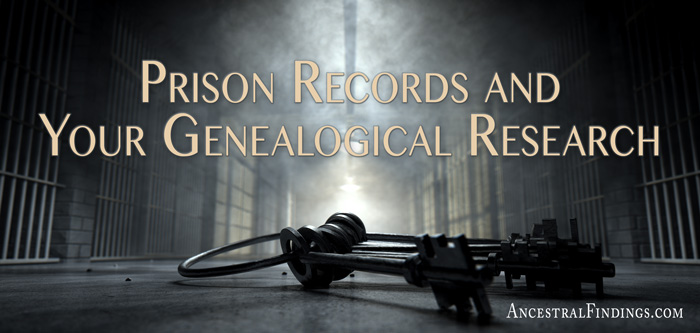Do you have any black sheep ancestors? Those are ancestors who were not necessarily squeaky clean. They lived outside the norms of society. They did odd and sometimes unusual things. Sometimes, those people were looked upon as strange or eccentric. Sometimes, people just smiled and shook their heads at the antics of these ancestors. Sometimes, they told other people, especially children to stay away from them, lest they be swayed and negatively influenced by these blatant and unashamed nonconformists. Sometimes, this non-conformity even equaled criminality, depending on the time and place in which a particular ancestor lived.
Are you sure you don’t have any black sheep ancestors? You might be surprised. While the things that are commonly considered crimes today have pretty much always been considered crimes, there were times and places in the world where seemingly innocent things today might get a person thrown in jail. If this happened, it might be big news in the community or family at the time. A family with a jailed relative often kept a low profile for a while. After the relative was released from jail (assuming they were released), the family usually didn’t talk about it, at all. It was a taboo topic, something best left in the past and forgotten by everyone. It would not be surprising if you did not hear tales of any imprisoned ancestors.
Whether you know for sure that you had one or more imprisoned ancestors or are just curious as to whether you did, you can look more into their lives before, during, and sometimes after jail. What you need to discover this information is prison records. This is what you need to know about them, where to find them, how to use them, and more. This article will also tell you what information you may find in those records, and how those records can sometimes point you to other records on that ancestor in different places.
Looking for Old Prison Records
If you aren’t sure whether you have an ancestor who was imprisoned at any point in American history, you can always go over to Ancestry.com and type names into their Prison Records database. This is called US Penitentiary Records, 1875-1963. It comprises prison records from all of the states. Give it a try. You might be surprised at who you find there. Even a brief stint in the clink for a minor infraction may be recorded there, and give you a look into a side of your ancestor’s life you (and maybe the rest of your current contemporary family) never knew. It certainly makes for interesting and spicy additions to a family tree.
If you know for sure that an ancestor was in jail for a time and want to know more about that experience for your ancestor, as well as about that ancestor themselves, you can start your search on Ancestry.com to find out where the original record is kept. You can still find out a lot on Ancestry.com, even scanned copies of original records, but it is always better to get the original record if you can. Sometimes the original record has additional information on it that was left off of the scanned version.
Records that are more than a century and a half old are usually kept at state archives in the state where the prison was located. Sometimes, you might find county jail records at the archives for the particular county. Federal prison records are at the National Archives in Washington, D.C. You can go there in person, or call, email, or write to the archives to ask for copies. Sometimes, they will send them to you for free, and sometimes for a nominal copy fee.
If you are looking for newer prison records, those will probably be kept at the state or county Department of Corrections, or at the prison itself. Some prisons, like Alcatraz, are famous, and have their own on-site archives, whether or not they are still in use as prisons, or have been converted to museums. Prisons with their own archives will usually have on-site staff to assist you in your search of their records. If it was an incarceration that was a few generations ago, you might be able to get the record pretty easily, sometimes just by asking.
If the incarceration was a more recent one, such as within your lifetime or the lifetime of your parents, you might have to prove your relationship to the prisoner to get the records, and only then if the prisoner has crossed over to the other side. Otherwise, the records would be considered confidential in most states (Florida is a notable exception) for living former inmates. If you need to prove your relationship to obtain the records you desire for your genealogy research, you will usually be able to do so by presenting birth, death, and marriage certificates that show your relationship to the former prisoner, as well as their crossed over status.
Occasionally, you may need to obtain a court order from a judge to obtain prison records. This is usually in cases where the prisoner is still alive but not able or competent to request such records on their own, or if there is a living victim of the former incarcerated person whose privacy needs to be protected. You might still be able to obtain the record with a court order in these cases, but if someone closely associated with the case is still in this life, you might be required to wait until more time has passed in order to obtain the records. It may take some time, effort, and deep researching to obtain the prison records you need or want for your genealogy research, but it is worth it. These records can tell you a wealth of information on this particular ancestor and their immediate family and friends. You can often get a physical description of them, sometimes a photo, a record of their behavior while in prison, which relatives and friends came to visit them, and possibly even where they went after they were released. This information can tell you so much about that particular ancestor, and can open doors to new avenues of research about them for you to follow.


